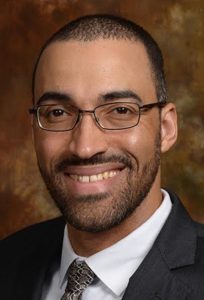In the midst of a surging pandemic that has killed 300,000 Americans plus an election that remains contested because the loser (and his idol-worshipping followers) will not accept the fact (defined as “a thing that is known or proved to be true,” according to the Oxford Dictionary), it is not surprising that some important stories have gone under-reported in the waning days of 2020.
Perhaps the most disturbing of those under-reported stories is the decision the outgoing president has made to execute as many federal death row inmates as possible before leaving office.

Paul Robeson Ford
The resumption of federal government executions began this summer with white inmates who were cynically and strategically scheduled to die so as to avoid further political fallout during a season of racial reckoning and mass nationwide protest. But since the beginning of December, the Justice Department has begun a killing spree that will take the lives of four Black men and one white woman for crimes that in many cases, occurred before the 21st century. There is not a person alive in this country who has witnessed this sort of rush to final judgment, as the last president to execute more than one person during a lame-duck period was Grover Cleveland — in 1884.
None of this, of course, should surprise us, as Attorney General Bill Barr (now himself leaving office before Christmas) has made his support for capital punishment known, and Donald Trump has repeatedly made his disregard for precedent and norms apparent. But just because it does not surprise us does not mean it should not grieve our spirits in almost ineffable ways.
These last five executions are scheduled to occur during and right after the Advent season, a time when we are called to celebrate hope, peace-with-justice, and joy. This season is a divine gift to us — especially after a year like this one — but as I pointed out in my last column, Advent comes with demands as well.
The character and content of Advent — as delineated in the opening chapters of Matthew and Luke’s Gospels — should make it crystal clear that something more is required of us during this time rather than the stone-hearted, cold, calculating and deeply cynical behavior of a Justice Department on the outs.
Mary sings in her Magnificat that God’s “mercy is for those who fear (reverence) him from generation to generation,” and further that God has “helped his servant Israel, in remembrance of his mercy.” Mary’s Magnificat is indispensable for understanding the purpose of Advent and the claim it makes on us as followers of the Risen Christ who started out in this world from the belly of a teenage girl of modest means.
What Mary speaks of is the quality of mercy, the decision by God to withhold divine wrath (“vengeance is mine,” says the Lord) and instead, to give us what we need to survive and thrive — rather than what we deserve based on our actions in this world, as reprehensible as they may be.
“Trump’s killing spree demonstrates a complete and utter disregard for the quality of mercy.”
Trump’s killing spree demonstrates a complete and utter disregard for the quality of mercy. Many have commented on how “out of step” these actions are, given that national support for capital punishment has steadily dropped in recent years; but the larger point is a moral one: If God is merciful toward us, how can we be so callous and unmerciful toward each other? And how stone-hearted, cold, calculating and deeply cynical do you have to be to carry out these executions during such a time as this? Who does that?
Perhaps the answer is this: Those who are Christian in name only. Those who are advocates of Christian causes when it is politically expedient to be so. Those who claim membership in the Christian faith as a matter of family tradition and public perception, but who are not really ready to contend for the cause of Christ when it goes against the wishes of those in power trying to make a petulant point on their way out the door.
Instead of choosing mercy, Trump is killin’ ’em for Christmas. This is appalling. This is abominable. This should bring us all immeasurable pain and grief. None of these perpetrators’ victims will be resurrected from the dead in exchange for their life. And the insights shared by those who are part of Murder Victims Families for Human Rights remind us that there is really no “closure” brought by killing someone because they killed your loved one. All there is, is another man or woman dead, another family traumatized for life, another family inflicted with the pain, horror and lasting grief that once and still visits the families of the victims.
We have known for years now that there are restorative justice alternatives to killing people in order to prove that killing people is wrong. We have known for years now that the death penalty is not a deterrent to murder. We have known for years now that the ranks of death rows all over this country — at the federal and state levels — are disproportionately populated with Black and brown people because of a criminal justice system that is broken by systemic racism and inequity.
“We have known for years now that the death penalty is not a deterrent to murder.”
This is why George Ryan commuted the sentences of all the inmates on Illinois’ death row before he left office as governor of that state in 2003. This is why President Obama placed an effective moratorium on executions at the federal level. This is why the death penalty abolition movement has been so successful in recent years in changing policy on a state-by-state level to end executions permanently.
While I should be invested in hope that the efforts to save the remaining inmates scheduled for execution will prevail, those campaigns have thus far fallen on deaf White House ears, and I am not optimistic that this will change.
But let us never forget what happens here. Let us never forget that when Trump and Barr had an opportunity to choose mercy, they chose retribution and revenge instead. Shame on them.
I pray that God will have mercy on us all this Advent — at least for those who truly fear God.
Paul Robeson Ford serves as senior pastor of First Baptist Church (Highland Avenue) in Winston-Salem, N.C. He was born and raised in New York City and grew up at the Riverside Church under the leadership of James A. Forbes Jr. He received a master of divinity degree from the Divinity School at the University of Chicago, where he is now a candidate for the Ph.D. in theology.
Related articles:
Opposition to capital punishment reportedly growing among conservatives
After 23 years in prison, Curtis Flowers is free


